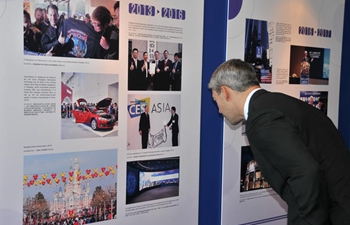ANKARA, July 18 (Xinhua) -- Turkey has condemned a U.S. decision to exclude it from NATO's F-35 fighter jet program following Ankara's purchase of Russian S-400 air defense system, warning that it will damage ties between the two NATO allies.
"This unilateral move is neither complied with the alliance spirit nor based on legitimate foundations," Turkish Foreign Ministry said in a statement early Thursday.
"It is unfair to remove Turkey, one of the partners in the F-35 program," the ministry said as it rejected assertions that the S-400 system would be a danger to NATO-operated F-35s.
"We invite the U.S. to take back this mistake which will pave the way to irreparable damage to our strategic relations," the Turkish ministry added.
Turkey planned buying more than 100 F-35 jets to replace its aging Air Force fleet constituted of F-16s and modernized F-4s.
Earlier on Wednesday, the U.S. announced it is removing Turkey from the F-35 program, following through on threats to do so over Ankara's purchase of the Russian system.
The Donald Trump administration had threatened to expel Turkey from the F-35 fighter program if it acquired the S-400 from Russia, warning the system could be used by Moscow to covertly attain secret information on the stealth fighter.
The delivery of S-400 components has been going on since last Friday with more than a dozen shipments of related equipment landed in Turkey over the last days.
Turkish pilots and maintenance staff who were sent to the U.S. to receive training on the platform are being notified that they will have to leave the country by the end of the month.
As an active member of the multinational consortium of partner producing the stealth fighter, Turkey stands to lose over 9 billion U.S. dollar in program work share from the over 900 parts it was to make over the life of the program, according to U.S. officials.
Experts are divided on the U.S. decision that was expected for a time now and had little impact on the volatile Turkish currency, very sensitive to developments regarding ties with the U.S..
"What the U.S. is doing is an anti-Turkish punitive project because Washington and Ankara have long had significant differences in many areas, especially regarding the Syrian war," said international relations expert Togrul Ismayil to Xinhua.
This scholar from Kahramanmaras University argued that the U.S. is dissatisfied over Ankara's effort to cooperate with Russia in Syria. "The U.S. is seeking to bring Turkey to its knees," he said, but has been outsmarted by Moscow seeking to achieve its goal of creating turmoil in NATO.
And this situation, he added, has been created "despite the fact that Ankara sought previously under the Barack Obama administration to purchase U.S.-made Patriot defence systems, and its request was rejected."
The relationship between the U.S. and Turkey has been strained for years, in part due to the conflict in Syria, as well as Washington's alliance with Syrian Kurdish fighters whom Ankara designates as terrorists.
Washington is also expected to impose sanctions against Ankara under the Countering America's Adversaries Through Sanctions Act (CAATSA), which mandates U.S. sanctions against anyone making a significant deal with the Russian defense industry.
Meanwhile, the European Union announced this week some punitive economic measures against Ankara over its energy drilling activities in a disputed zone off the island of Cyrus in Eastern Mediterranean, putting Turkey in a diplomatically difficult spot.
"We were not compelled to come to is point," indicated for his part Sinan Ulgen, a former Turkish diplomat and chairman of Istanbul-based think-tank Edam. He argued that Turkey would not be excluded from the F-35 if it had opted for the European missile system Eurosam SAMP-T, interoperable with NATO systems.
"We would have stayed in the F-35 program, our defense industry firms would have secured their portfolios and we would also not be speaking of CAATSA sanctions," he noted.

















